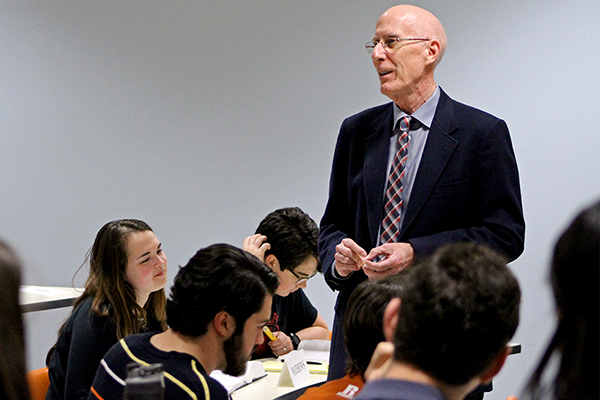For students taking associate government professor H.W. Perry’s Civil Liberties class, there is a trigger warning waiting for them in the syllabus: Perry “may use the ‘n word’ or sexist words or graphically describe indecent situations” to provoke discussions about whether they should be protected speech.
The warning also says if a student would find such discussions too hurtful or troubling, the student should not take the course. Perry, who identifies as a white male, said using these words is necessary for a discussion about constitutional law. Perry said while he doesn’t use the “n word” gratuitously, his class often watches videos with frequent use of it, such as the documentary series “Eyes on the Prize.”
“I believe these are very hurtful, ugly words,” Perry said. “But people have a constitutional right to use (them).”
Images concerning pornography or abortion are also shown in class. Perry said he informs students beforehand and does not have a problem with students stepping out of the room.
“On the first day, (Perry) told us we’d be arguing Supreme Court cases that revolve around people saying foul things,” philosophy senior Shivam Paragji said. “So (Perry said) we’re going to be using (foul) language … because it’s necessary to talk about the cases.”
Paragji said he appreciates Perry not holding anything back. However, Karma Chávez, the College of Liberal Arts Diversity and Inclusion Committee co-chair, said she does not agree with Perry’s policy.
“Just because you can legally say something (doesn’t) mean you should say it,” Chávez said. “But a white man in a position of power threatening to use racist and sexist language should be no surprise to anyone. It is unfortunate that women and students of color may have to opt out of his courses so as not to be faced with the potential of such violence.”
Perry said that the he doesn’t think using the “n word” in a classroom setting is an example of violence.
“As an educator, I’m not sure that…my being white should differentiate a student having to hear that word from someone who’s black,” Perry said in response.
African and African diaspora studies professor Kevin Cokley, who said he does not use the “n word” in his own classes, said no one should use the “n word.”
“For (Perry), being a scholar on free speech, I understand the point he’s trying to make,” Cokley said. “But I think that you can refer to it as the ‘n word’ … and you can get across the point that you’re trying to make in that particular class, and you will not have offended students in the process of doing that.”
Perry said he does not allow students to use racial epithets such as the “n word,” and said he has had many minority students thank him for engaging in topics related to race. He said while it may make students uncomfortable, it’s important for them to understand the troubling history of the “n-word.”
“I can understand why that might be so jarring that the student would just prefer not to see it, but we’re adults trying to deal with the problem of racism … and constitutional law,” Perry said.
Editor's note: A previous version of this article misquoted Perry's syllabus. The Texan regrets this error.





















